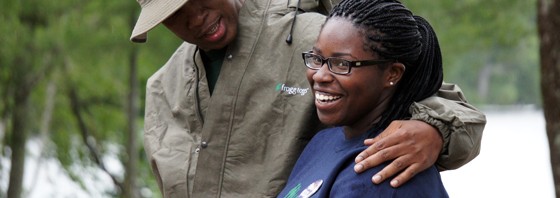King calls for facing the challenges of peace
AMMAN | His Majesty King Hussein Thursday said the challenges facing the peace process are not easy, and called for collective work to face and overcome such challenges.
“We all should work with open minds to overcome such challenges, through achieving peace amongst ourselves and removing all obstacles facing peace the obstacles that have limited our movement and our freedom to work for peace,” the King said.
Addressing participants at a conference for the “Seeds of Peace” gathering which concluded in Petra on Wednesday, King Hussein outlined the importance of such an assembly, which works to promote peace and achieve people’s aspirations in overcoming the forces of evil and darkness, and establishing peace.
At an audience at the Royal Court, attended by Royal Chief Awn Khasawneh, Chief Chamberlain Prince Raad Ben Zeid, Executive Director of Noor Al Hussein Foundation Ibrahim Badran, U.S. Ambassador to Jordan Wesley Egan and the Israeli Charge d’Affaires Jacob Rosen, King Hussein said, “We are part of the peace process and we hope that this gathering will expand and grow to be able to achieve all its objectives and overcome all the obstacles impeding its advancement and success.”
The King praised the efforts of the members of the gathering, saying that their shared ideas and aspirations will achieve the long-sought future.
King Hussein said he hoped the participants will be bale to achieve their objectives in peace-building and assume leadership positions in the future so that they can translate their ideas into action.
Founder of the Seeds of Pace gathering John Wallach, a U.S. citizen, presented King Hussein with a carpet and an embroidered necktie, carrying the words “seeds of peace,” in addition to two portraits of King Hussein and the late King Abdullah, drawn by participants in the gathering.
In a gesture of appreciation of the group’s contribution to the peace making process, King Hussein removed his necktie and replaced it with the embroidered one, presented by Mr. Wallach on behalf of the group. Mr. Wallach said the gathering decided to hold its annual meetings in Petra in appreciation of the role of His Majesty King Hussein and Jordan in the peace making process.
Summing up the objectives of the gathering which was founded in 1993 following the attack on the World Trade Center in New York, Mr. Wallach said the gathering groups almost 300 young people aged 12 to 14 and seeks to sow seeds of peace in the Middle East and elsewhere and to promote awareness among the young generations about the importance of peace as a human and cultural value.
Mr. Wallach said, “We in the gathering share ideas, thoughts and perceptions on peace making, by working together for the interest of humankind.”
Taking part in the Seeds of Peace conference were 246 participants from Jordan, Egypt, Palestine, the United States and Israel.




 During four intensive days of workshops, seminars and discussions, over 50 Afghan, American, Egyptian, Indian, Israeli, Jordanian, Pakistani and Palestinian Seeds created a mission statement and discussed a number of service projects graduate Seeds hope to carry out either in their own communities, or in cooperation with Seeds from other countries.
During four intensive days of workshops, seminars and discussions, over 50 Afghan, American, Egyptian, Indian, Israeli, Jordanian, Pakistani and Palestinian Seeds created a mission statement and discussed a number of service projects graduate Seeds hope to carry out either in their own communities, or in cooperation with Seeds from other countries. Since 2001, in partnership with the U.S Department of State, Seeds of Peace has been bringing together young Indians and Pakistanis for one-of-a-kind conflict resolution programming—at the Seeds of Peace Camp in Maine and in Lahore and Mumbai. Seeds of Peace is the only nonprofit organization in the world doing this kind of programming.
Since 2001, in partnership with the U.S Department of State, Seeds of Peace has been bringing together young Indians and Pakistanis for one-of-a-kind conflict resolution programming—at the Seeds of Peace Camp in Maine and in Lahore and Mumbai. Seeds of Peace is the only nonprofit organization in the world doing this kind of programming. Twenty-four Palestinian educators from Tulkarem, Jenin, Hebron, Walla Jay and Jerusalem participated in a Seeds of Peace workshop aimed at equipping them with skills to create peaceful learning environments.
Twenty-four Palestinian educators from Tulkarem, Jenin, Hebron, Walla Jay and Jerusalem participated in a Seeds of Peace workshop aimed at equipping them with skills to create peaceful learning environments. The event took place at the Notre Dame Hotel in Jerusalem in partnership with Friends of the Earth-Middle East (FoEME). Presenters sketched a bleak picture of the water situation in the region: there is not enough water to meet increasing demand; the water that exists is increasingly polluted; and water resources are distributed with radical inequality. They then described real and dangerous challenges that can only be solved through joint action. Israelis, Palestinians and Jordanians should cooperate-not because of an abstract longing for peace, but because of immediate, tangible, positive improvements.
The event took place at the Notre Dame Hotel in Jerusalem in partnership with Friends of the Earth-Middle East (FoEME). Presenters sketched a bleak picture of the water situation in the region: there is not enough water to meet increasing demand; the water that exists is increasingly polluted; and water resources are distributed with radical inequality. They then described real and dangerous challenges that can only be solved through joint action. Israelis, Palestinians and Jordanians should cooperate-not because of an abstract longing for peace, but because of immediate, tangible, positive improvements.

